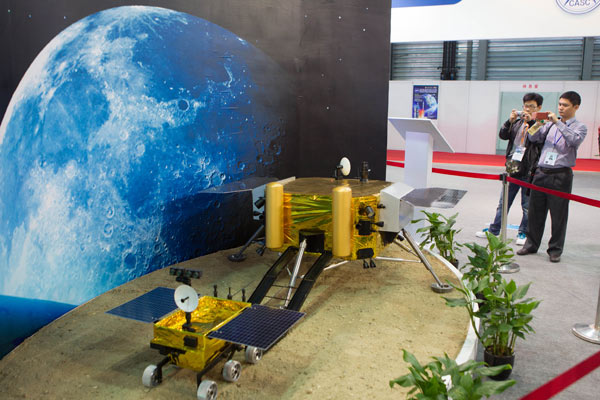China Readies Moon Rover Mission
China Daily, November 29, 2013 Adjust font size:
|
|
|
A model of the Chang'e-3 lunar rover is on display at an exposition in Shanghai this month. Wu Zhijian, spokesman for the State Administration of Science, Technology and Industry for National Defense, said at a news conference on Tuesday that the Chang-e'3 lunar probe will be launched in early December. The soft lunar landing will be the first by any country in 37 years. [China Daily] |
China is counting down to the launch of its first lunar rover mission, which will blast off early next month.
While final touches are being put on the Chang'e-3 spacecraft and its carrier rocket, scientists cautioned that the voyage to the moon is risky.
"More than 80 percent of the technology adopted in the mission is new, and with new technology and products carrying out new tasks, there are certainly great risks," said Li Benzheng, deputy commander in chief of the lunar exploration program.
The mission represents the first time China has attempted a soft landing on a celestial body, and also the first time any lunar soft landing has been carried out since 1976, when other countries suspended exploration, Li said on Tuesday in Beijing.
After touching down on the moon's surface, the unmanned craft will unleash its roving vehicle, dubbed Yutu, or "jade rabbit" in Chinese. In folklore, a white rabbit was the pet of moon goddess Chang'e. The modern version will roam the moon's surface to learn more about Earth's satellite, he said.
"It could be a trying process for the rover to move down the lander," Li told Tuesday's news conference.
The Chang'e-3 mission is the second phase of China's lunar program, which includes orbiting, landing and returning to Earth. It follows the success of the Chang'e-1 and Chang'e-2 missions in 2007 and 2010. The country expects to have an unmanned spacecraft return with lunar samples by 2020.
Although the previous duo laid the foundation for the current mission, Chinese scientists still have limited knowledge of the moon, Li said.
Of the 129 lunar explorations conducted by various countries, 49 percent failed, Li said, citing his agency's analysis.
"This indicates that explorations do, indeed, carry significant risks," he said.



